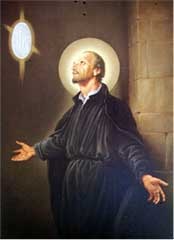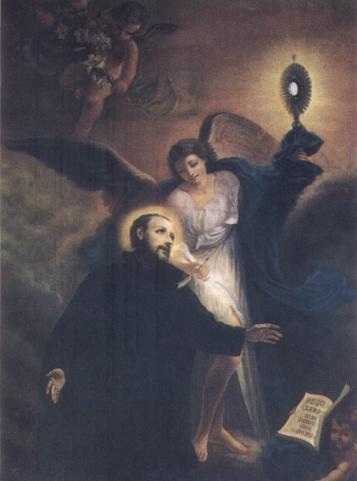
Ascanio Caracciolo, moved by a special love and devotion he had to the holy Francis of Assisi, took, when he made his solemn profession, the name of Francis. After two years, John Adorno departed this life, and Francis, against his own will, was made Head of the Order. In this office he shone a burning light of grace. Devoted to the prosperity of the Institute, he earnestly sought the blessing of God upon it, by constant prayer, by tears, and by stern treatment of his own body. In this work, he thrice travelled into Spain in the guise of a pilgrim, and begging his bread from door to door. In these his journeys he suffered very great hardships, and was most wonderfully holpen of the Almighty, especially one while when he was on shipboard and the ship nigh to perish, but for the work of his prayers. He toiled hard in those countries to attain his wishes, but through the widespread fame of his holy life, and the noble generosity of the Most Catholic Kings Philip II and Philip III, he overcame with his brave perseverance the opposition of all that withstood him, and founded several houses of his Order. This he was able to do in Italy also.
He was a great pattern of lowliness, so that when he came to Rome he betook himself to an almshouse, and chose a leper for his familiar friend. Paul V offered him divers honours in the Church, but he firmly refused them all. He preserved his purity unspotted, and when certain shameless women set themselves to attack his chastity, he took the occasion to gain over their souls for Christ. Toward God's great mystery of the Eucharist he was drawn with passionate tenderness, and would pass almost whole nights without sleep, simply adoring it. This godly custom he established in his Order, to be kept up therein for ever, the peculiar mark thereof. He was a great encourager of the worship of the Maiden Mother of God. He was hot with strong love for his neighbour. He was gifted with prophecy, and the discerning of spirits. In the forty-fourth year of his age he was continuing long in prayer in the Holy House of Loreto, when it was made known to him that the end of his earthly life was at hand. He straightway took his way to the Abruzzi, and was there seized with illness while he was with the disciples of St. Philip Neri, in the town of Agnone. He received with great devotion the Sacraments of the Church, and then, upon the 4th day of June, being the Eve of the Feast of the Body of Christ, in the year 1608, he very peacefully fell asleep in the Lord. His sacred body was carried to Naples, and there honourably buried in the Church of St. Mary Major, where he had laid the first foundations of his Order. As he became distinguished for miracles Pope Clement XIV enrolled his name, with solemn pomp, among those of the Blessed, and Pope Pius VII, in the year 1807, finding his mighty works continue, added it to the list of the Saints.





